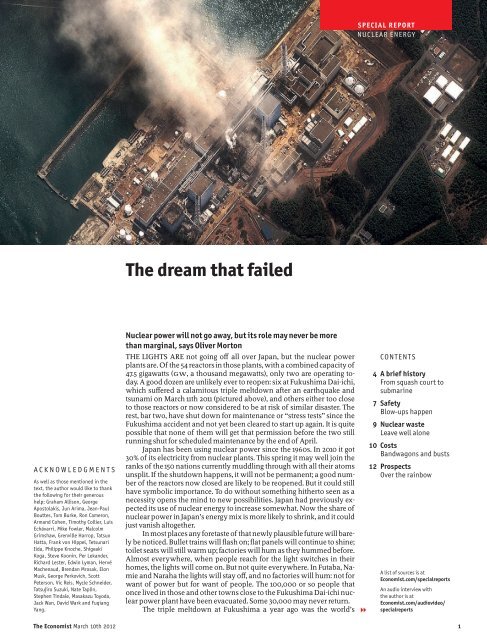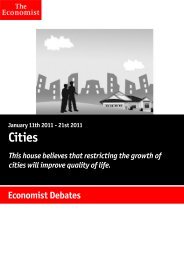The dream that failed
The dream that failed
The dream that failed
Create successful ePaper yourself
Turn your PDF publications into a flip-book with our unique Google optimized e-Paper software.
ACKNOWLEDGMENTS<br />
As well as those mentioned in the<br />
text, the author would like to thank<br />
the following for their generous<br />
help: Graham Allison, George<br />
Apostolakis, Jun Arima, Jean-Paul<br />
Bouttes, Tom Burke, Ron Cameron,<br />
Armand Cohen, Timothy Collier, Luis<br />
Echávarri, Mike Fowler, Malcolm<br />
Grimshaw, Grenville Harrop, Tatsuo<br />
Hatta, Frank von Hippel, Tetsunari<br />
Iida, Philippe Knoche, Shigeaki<br />
Koga, Steve Koonin, Per Lekander,<br />
Richard Lester, Edwin Lyman, Hervé<br />
Machenaud, Brendan Mrosak, Elon<br />
Musk, George Perkovich, Scott<br />
Peterson, Vic Reis, Mycle Schneider,<br />
Tatsujiro Suzuki, Nate Taplin,<br />
Stephen Tindale, Masakazu Toyoda,<br />
Jack Wan, David Wark and Fuqiang<br />
Yang.<br />
<strong>The</strong> <strong>dream</strong> <strong>that</strong> <strong>failed</strong><br />
Nuclear power will not go away, but its role may never be more<br />
than marginal, says Oliver Morton<br />
THE LIGHTS ARE not going o all over Japan, but the nuclear power<br />
plants are. Of the 54 reactors in those plants, with a combined capacity of<br />
47.5 gigawatts (GW, a thousand megawatts), only two are operating today.<br />
A good dozen are unlikely ever to reopen: six at Fukushima Dai-ichi,<br />
which suered a calamitous triple meltdown after an earthquake and<br />
tsunami on March 11th 2011 (pictured above), and others either too close<br />
to those reactors or now considered to be at risk of similar disaster. <strong>The</strong><br />
rest, bar two, have shut down for maintenance or stress tests since the<br />
Fukushima accident and not yet been cleared to start up again. It is quite<br />
possible <strong>that</strong> none of them will get <strong>that</strong> permission before the two still<br />
running shut for scheduled maintenance by the end of April.<br />
Japan has been using nuclear power since the 1960s. In 2010 it got<br />
30% of its electricity from nuclear plants. This spring it may well join the<br />
ranks of the 150 nations currently muddling through with all their atoms<br />
unsplit. If the shutdown happens, it will not be permanent; a good number<br />
of the reactors now closed are likely to be reopened. But it could still<br />
have symbolic importance. To do without something hitherto seen as a<br />
necessity opens the mind to new possibilities. Japan had previously expected<br />
its use of nuclear energy to increase somewhat. Now the share of<br />
nuclear power in Japan’s energy mix is more likely to shrink, and it could<br />
just vanish altogether.<br />
In most places any foretaste of <strong>that</strong> newly plausible future will barely<br />
be noticed. Bullet trains will ash on; at panels will continue to shine;<br />
toilet seats will still warm up; factories will hum as they hummed before.<br />
Almost everywhere, when people reach for the light switches in their<br />
homes, the lights will come on. But not quite everywhere. In Futaba, Namie<br />
and Naraha the lights will stay o, and no factories will hum: not for<br />
want of power but for want of people. <strong>The</strong> 100,000 or so people <strong>that</strong><br />
once lived in those and other towns close to the Fukushima Dai-ichi nuclear<br />
power plant have been evacuated. Some 30,000 may never return.<br />
<strong>The</strong> triple meltdown at Fukushima a year ago was the world’s<br />
SPECIAL REPORT<br />
NUCLEAR ENERGY<br />
1<br />
CONTENTS<br />
4 A brief history<br />
From squash court to<br />
submarine<br />
7 Safety<br />
Blow-ups happen<br />
9 Nuclear waste<br />
Leave well alone<br />
10 Costs<br />
Bandwagons and busts<br />
12 Prospects<br />
Over the rainbow<br />
A list of sources is at<br />
Economist.com/specialreports<br />
An audio interview with<br />
the author is at<br />
Economist.com/audiovideo/<br />
specialreports<br />
<strong>The</strong> Economist March 10th 2012 1
















